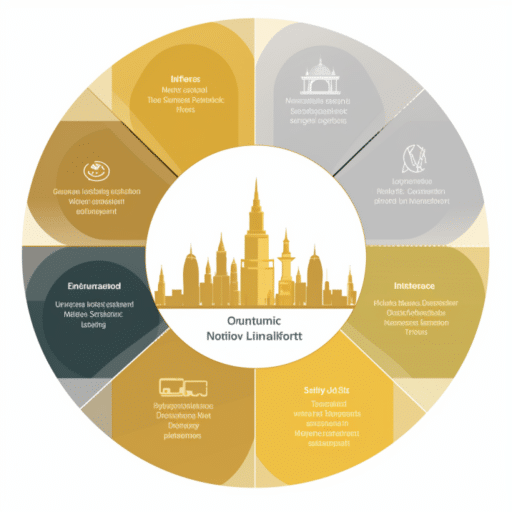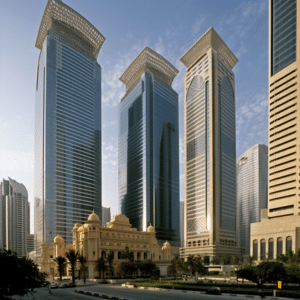HNWI islamic investments have garnered significant attention in the financial world due to their unique approach that aligns with the principles of Shariah law. This approach emphasizes ethical and transparent financial practices, setting it apart from conventional investments.
Let’s delve deeper into the intricacies of Islamic investments and understand why high-net-worth individuals are increasingly gravitating toward them.
If you want to invest as an expat or high-net-worth individual, you can email me (advice@adamfayed.com) or use these contact options.
Table of Contents
The Essence of Islamic Investments
Islamic investments are not just about financial returns; they are about ensuring that the money is invested in a manner that aligns with the moral and ethical principles of Islam. At the heart of these principles lies the concept of Halal investing.
Halal Investing
Halal, in Arabic, means permissible. In the context of investments, it refers to those that are permissible under Islamic law. Halal investing ensures that the funds are not channeled into businesses or ventures that are forbidden (Haram) in Islam, such as alcohol, gambling, or pork-related products.
Prohibition of Riba (Interest)
One of the most distinguishing features of Islamic investments is the prohibition of Riba. Riba, or interest, is considered unjust and exploitative in Islam. By avoiding interest, Islamic finance promotes a system where risk and reward are shared between parties, fostering a sense of partnership and mutual respect.

Why High-Net-Worth Individuals are Turning to Islamic Investments
The shift towards Islamic investments is not just a trend; it’s a reflection of the growing recognition of its ethical foundation and robust financial principles.
Ethical and Transparent Practices
High-net-worth individuals often seek investments that not only offer good returns but also align with their personal values. HNWI islamic investments, with their emphasis on ethical practices, resonate with these individuals. Transparency in transactions ensures that investors know where their money goes and how it is utilized.
Diversification and Risk Management
Diversification is a cornerstone of an investment strategy. HNWI islamic investments offer a range of products, from equities to bonds (Sukuk) and real estate, allowing investors to diversify their portfolios.
Moreover, the risk-sharing principle inherent in Islamic finance means that losses, if they occur, are not borne by one party alone, leading to better risk management.
Growing Global Acceptance
Over the years, many global financial hubs have recognized and integrated Islamic finance into their systems. This global acceptance has further boosted the confidence of high-net-worth individuals in HNWI islamic investments.
Core Principles of HNWI Islamic Investments
The Prohibition of Haram (Forbidden) Investments
Islamic investments maintain a rigorous code of ethics, ensuring that all financial activities align with the principles of Shariah law.
Industries Considered Haram
- Alcohol: Islamic investments avoid any business dealing with the production, distribution, or sale of alcoholic beverages. Alcohol consumption goes against the teachings of Islam, making it a prohibited industry for investment.
- Gambling: The unpredictability and reliance on chance in gambling make it Haram. Islamic investments, therefore, exclude any companies or industries related to gambling or betting.
- Pork: Pork and its by-products are strictly forbidden in Islam. Consequently, any company involved in the production, processing, or sale of pork products does not qualify for Islamic investment.
Avoiding Highly Leveraged Companies
Highly leveraged companies, those that carry a significant amount of debt, pose a risk in the realm of HNWI islamic investments. The prohibition of Riba (interest) in Islamic finance means that companies with interest-bearing debt exceed permissible limits, making them unsuitable for Shariah-compliant investment.
Emphasis on Profit and Loss Sharing
HNWI islamic investments prioritize justice and fairness, ensuring that both parties in a financial transaction share the risks and rewards.

Mudarabah (Profit Sharing Partnership)
Mudarabah stands out as a unique financial instrument in HNWI islamic investments. In this partnership, one party provides the capital, while the other offers expertise and management. Profits get distributed based on a pre-agreed ratio, but if there’s a loss, the capital provider bears it.
Musharakah (Joint Venture Partnership)
Musharakah represents a joint venture where all parties contribute capital and share in both the profits and losses. It’s a flexible arrangement, allowing partners to specify their profit-sharing ratios, ensuring that Islamic investments remain fair and equitable.
Investment Vehicles Suited for High-Net-Worth Individuals
Sukuk (Islamic Bonds)
Sukuk, often referred to as Islamic bonds, are financial certificates that comply with Islamic religious law, Shariah. Unlike traditional bonds that involve interest, Sukuk represents ownership in a tangible asset or project.
With the rise of Islamic finance, Sukuk has gained immense popularity since its inception in Malaysia in 2000. Bahrain followed suit in 2001. Today, both Islamic corporations and state-run organizations globally use Sukuk, capturing an increasing share of the global fixed-income market.
Islamic law prohibits “riba” or interest, making traditional Western debt instruments unsuitable for raising capital. Sukuk circumvents this by linking returns and cash flows to a specific asset, allowing investors to bypass the prohibition and still reap the benefits of debt financing.
Sukuk vs. Traditional Bonds
While Sukuk and conventional bonds share similarities, they also have distinct differences. Both provide investors with payment streams and can raise capital for firms.
However, Sukuk involves asset ownership, while bonds represent debt obligations. If the asset backing a Sukuk appreciates, the Sukuk can appreciate, whereas the bond yield strictly adheres to its interest rate.
Islamic Real Estate Investment Trusts (REITs)
Islamic REITs operate based on the principles of HNWI islamic investments, ensuring all properties and assets align with Shariah law. These trusts have seen a surge in popularity among affluent investors, offering a chance to diversify portfolios while maintaining ethical standards.
Benefits of Islamic REITs
Islamic REITs provide investors with a stable income stream derived from rental income. They also offer potential capital appreciation from property value increments. Since these REITs strictly adhere to Shariah principles, they invest only in properties that generate halal income, ensuring compliance and ethical investing.
Shariah-Compliant Equities and Mutual Funds
The global market offers a vast array of Shariah-compliant equities and mutual funds. These funds undergo rigorous screening to ensure alignment with Islamic investment standards.
To be considered Shariah-compliant, stocks must pass several criteria. They must not derive income from haram (forbidden) sources such as alcohol, gambling, or pork. Additionally, their debt ratio and interest income must fall within permissible limits set by Shariah scholars.
Diversifying Portfolios with Islamic Alternative Investments
Islamic Private Equity and Venture Capital
The world of HNWI islamic investments is witnessing a surge in interest in the halal industry. With a focus on products and services that adhere to Islamic principles, this industry encompasses diverse sectors, including halal food, fashion, cosmetics, and healthcare. High-net-worth individuals are capitalizing on the growth potential of these sectors by investing in Islamic private equity and venture capital funds.

Nurturing Promising Startups and Businesses
Islamic private equity and venture capital offer a gateway for affluent investors to nurture promising startups and businesses. These investments provide much-needed capital for companies that align with Shariah-compliant practices. This not only promotes ethical business growth but also provides investors with the potential for significant financial returns.
Expanding into New Markets
The concept of HNWI islamic investments is not limited to a specific geographic region. Islamic private equity and venture capital funds are venturing into both traditional and emerging markets, connecting investors with opportunities that cater to the needs and preferences of Muslim consumers worldwide. This expansion is driving innovation and fostering economic growth in various regions.
Islamic Commodity Trading
Gold and silver have held a revered place in Islamic finance throughout history. Today, these precious metals continue to play a significant role in Shariah-compliant investment strategies.
Investors seeking stability in their portfolios turn to Shariah-compliant gold and silver investments as a means to hedge against inflation and market volatility.
Shariah-Compliant Trading Platforms
Modern financial markets offer dedicated platforms for Shariah-compliant commodity trading. These platforms ensure that trading adheres to Islamic principles, such as the prohibition of Riba (interest) and excessive uncertainty. High-net-worth individuals can access these platforms to invest in commodities like gold and silver while also maintaining their commitment to ethical financial practices.

Salam and Istisna Contracts for Diversification
Beyond traditional commodity trading, HNWI islamic investments offer further diversification through Salam and Istisna contracts. Salam contracts involve advance payment for the future delivery of a commodity, ensuring security for both the buyer and the seller.
Istisna contracts, on the other hand, are tailored for specific manufacturing projects, allowing investors to participate in the creation of tangible assets.
Challenges and Considerations in Islamic Investments
Navigating the Global Financial Landscape
The global financial landscape is known for its volatility and unpredictability. This holds true even for experienced investors. However, individuals committed to Islamic investments face an additional layer of complexity.
Understanding geopolitical risks becomes imperative as these risks can significantly impact investment outcomes. Economic shifts, political events, and regional conflicts can all influence the performance of Islamic investments.
Moreover, the dynamic nature of financial regulations requires constant vigilance. Regulatory changes can have profound implications for Islamic investments. High-net-worth investors must be proactive in staying updated about evolving global financial regulations to ensure that their investment strategies remain compliant with both international standards and Islamic principles.
Addressing Geopolitical Risks
Geopolitical risks, such as trade tensions and regional conflicts, can lead to sudden market fluctuations. For those engaged in Islamic investments, these risks can impact not only financial returns but also the ethical alignment of investments.
Active monitoring of geopolitical developments and their potential impact on different investment sectors is crucial for informed decision-making.
Adapting to Regulatory Changes
Staying abreast of changing regulations is a constant challenge in the financial world. For Islamic investments, this challenge is twofold, requiring adherence to both global financial regulations and Shariah principles.
High-net-worth individuals must have a robust understanding of the evolving regulatory landscape and the ways it can affect their investment portfolios. Engaging with legal and financial experts well-versed in Islamic finance can provide valuable insights and guidance in navigating these regulatory complexities.
Ensuring Shariah Compliance
Ensuring Shariah compliance is the cornerstone of Islamic investments. The core tenets of Shariah law dictate the ethical boundaries within which investments must operate.
High-net-worth individuals who choose Islamic investments seek both financial growth and ethical alignment with their beliefs. This makes adhering to Shariah principles a paramount consideration in their investment journey.
Role of Shariah Advisory Boards
To ensure Shariah compliance, many institutions offering Islamic investments establish Shariah advisory boards. These boards consist of Islamic scholars and financial experts who analyze investment opportunities and assess their alignment with Shariah principles.
Their role is to provide guidance, evaluate investments, and ensure that all financial activities remain within the boundaries of Islamic law. High-net-worth individuals benefit from the expertise of these boards, which helps them make investment decisions that are both financially sound and ethically aligned.
Regular Audits and Reviews
Continuous monitoring is vital to maintaining Shariah compliance in investment portfolios. Regular audits and reviews are conducted to assess the ongoing compliance of investments with Islamic principles.
High-net-worth investors can have confidence in the transparency and ethical integrity of their investments, knowing that independent audits are conducted to verify compliance. This practice not only safeguards the investors’ ethical values but also contributes to building trust in the Islamic finance ecosystem.

Conclusion: The Future of Islamic Investments for the Wealthy
The appeal of ethical investing continues to grow, with Islamic investments leading the charge. As emerging markets and sectors open up, high-net-worth individuals will find even more opportunities to diversify their portfolios while staying true to their values. The future of Islamic investments looks bright, promising both ethical growth and financial prosperity.
Pained by financial indecision? Want to invest with Adam?

Adam is an internationally recognised author on financial matters, with over 760.2 million answer views on Quora.com, a widely sold book on Amazon, and a contributor on Forbes.



